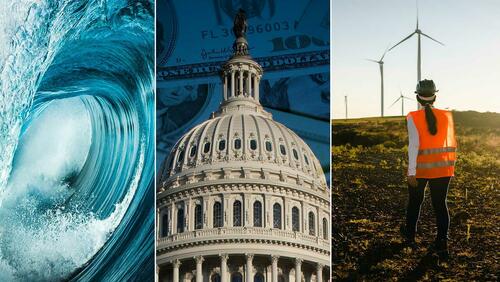By Lydia Saad of Gallup,
Efforts to promote adoption of the environmental, social and governance framework in investing, commonly termed ESG, have gained traction in recent years and have become the subject of pro- and anti-ESG legislation, yet the general public is no more familiar with ESG today than two years ago.
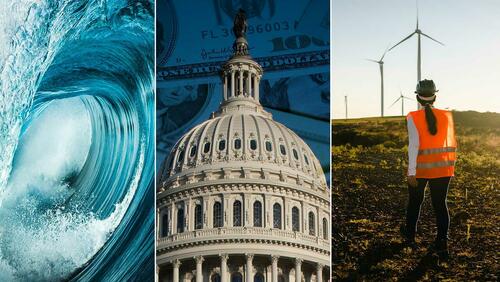
Thirty-seven percent of Americans currently report being “very” or “somewhat familiar” with ESG, unchanged from 36% in 2021. Another 22% today are “not too familiar,” while 40% are “not familiar at all.”
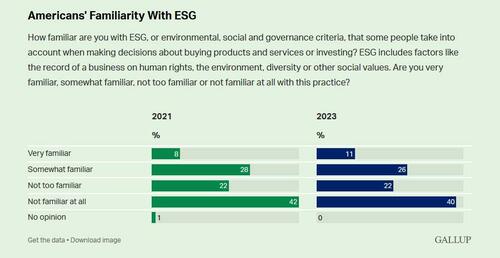
These findings are from a Gallup poll conducted April 3-25, in which respondents were told that ESG “includes factors like the record of a business on human rights, the environment, diversity or other social values” and that some people take these factors “into account when making decisions about buying products and services or investing.”
Most Have No Opinion on the ESG Movement
Underscoring the public’s lack of familiarity with ESG, nearly six in 10 Americans (59%) take the “no opinion” option when asked if they view “the movement to promote the use of environmental, social and governance, or ESG, factors in business and investing” as a positive or negative development. The remaining four in 10 are about evenly divided between expressing a positive (22%) and negative (19%) view of the practice.
While adults who are familiar with ESG are more likely to express an opinion about it than those with less familiarity, they are just as likely to be divided on the question — 36% viewing ESG positively and 35% negatively.
Similarly, adults who report owning stock, about six in 10 respondents in the current poll, are more likely to have an opinion about ESG than non-stock owners, but they are just as divided on the merits of promoting ESG in business and investing.
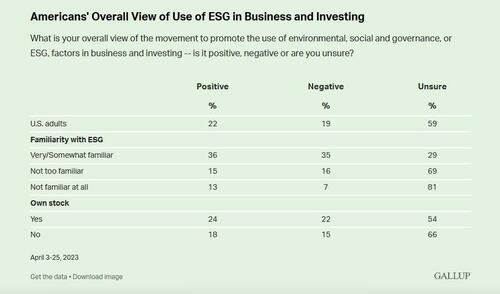
Americans Lean Slightly Against Factoring ESG Into Investment Decisions
When asked whether retirement fund managers should only take financial factors into account when making investment decisions or also consider ESG factors, the public leans toward the former (48% vs. 41%, respectively). Stock owners’ views on this are nearly identical to the national averages.
Adults familiar with ESG are closely split on the question, with 50% preferring fund managers to limit their investing criteria to financial factors while 46% want ESG factors considered. Those not familiar with ESG lean more strongly toward only considering financial factors but are also more likely to have no opinion on the question.
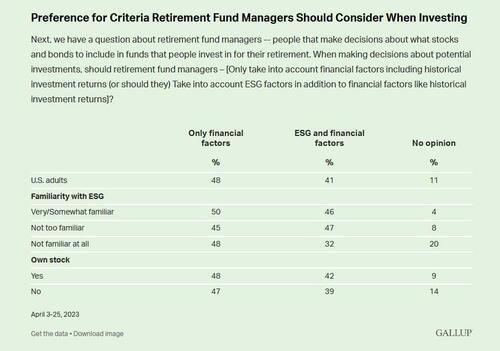
Partisans Lean Different Ways on ESG, but Neither Group Is Attentive to the Issue
Adoption of ESG principles has been promoted by the Biden administration as well as the Business Roundtable (a leading American business lobby), the United Nations, and other prominent organizations in the U.S. and globally. The leaders and companies embracing ESG in investing have espoused it as a way to minimize investment risk while promoting social goods. Yet critics on the political right decry it as a system designed to achieve progressive goals at the expense of shareholders, and have advanced anti-ESG legislation in many states.
While this political backdrop is evident in the Gallup data, it does not appear to be an overwhelming factor driving the public’s interest in or views about ESG.
- There is no difference between Republicans’ and Democrats’ familiarity with ESG, as just under four in 10 in each group say they are very or somewhat familiar with it and an equal proportion are not at all familiar.
- Further, awareness of ESG hasn’t increased much among either group since 2021, when 33% of Republicans and 38% of Democrats said they were very or somewhat familiar with it.
- Republicans are far more likely to have a negative than positive view of ESG, while the reverse is true of Democrats, but majorities of both groups say they are unsure.
- Only when asked to choose between two modes of investing — with or without taking ESG criteria into account — do majorities of Republicans and Democrats take opposing sides. Sixty-four percent of Republicans think fund managers should only consider financial factors when choosing investments, while 59% of Democrats think they should include ESG.
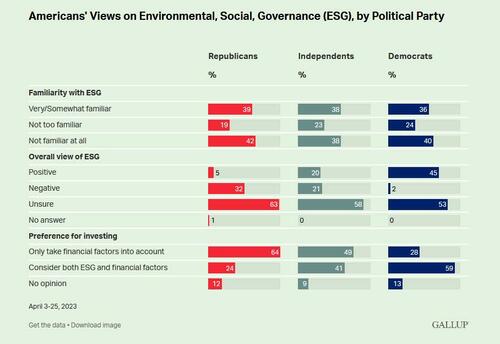
Bottom Line
ESG proponents are actively working to have ESG scores become a standard part of corporate fiduciary reporting so that consumers and investors can make informed decisions about whom to do business with. Meanwhile, Republicans have ramped up their opposition to the movement, both vocally and politically, passing legislation to prevent state governments from investing in funds that use certain ESG criteria.
As a Harvard Law School publication recently noted, “When it comes to ESG in the United States, among the most dramatic developments is an ideological battle unfolding at the state level, pitting liberal-leaning state governments that have embraced ESG-focused investing against conservative-led states that would seek to exclude it.”
Yet, public opinion reflects little of this political battle, with most Republicans and Democrats largely unfamiliar with ESG and expressing “no opinion” on whether it is good or bad, when given that option. To be sure, Republicans’ and Democrats’ underlying tendencies align with their parties’ respective positions on ESG policy — but at least for now, the issue does not seem highly politicized among the American public.
Loading…
https://www.zerohedge.com/markets/democrats-love-esg-republicans-hate-it-most-americans-dont-care-either-way
